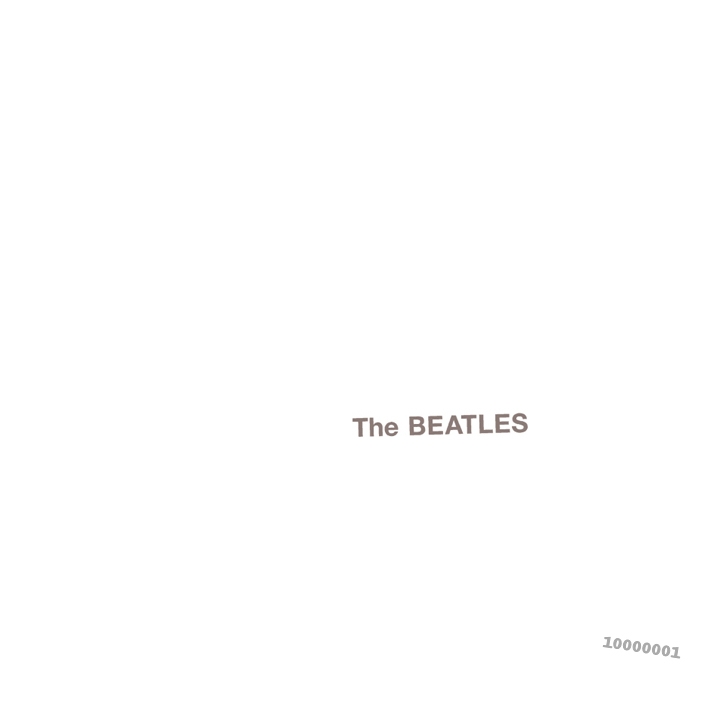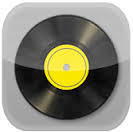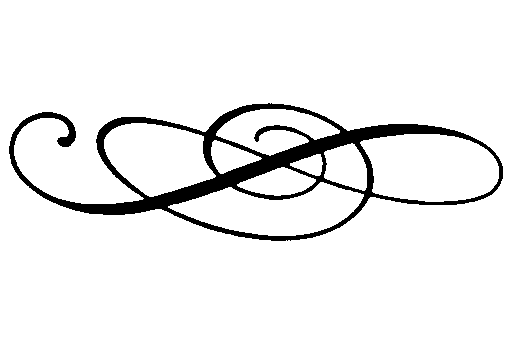

 The Beatles
The Beatles
| Release date | Label | Producer | Genre | Length | More info |
| 1968.11.22 | Apple | George Martin | Pop Rock | 93:35 |  
 |
Nothing like a cover of pure white to mask the most colorful flight of imagination ever.
Background
The White Album is all about survival in a strange new world. As far as early 1967, the Beatles were the indisputable active commanders-in-chief of the rapidly maturing pop/rock scene - at least, its chief attraction in terms of mass international popularity combined with an unspoken pledge of constant artistic progress. But as the aforementioned pop/rock scene matured to the point of becoming the chief provider of cutting-edge musical achievements, and began splintering into specialized directions like art-rock, hard rock, folk-rock, etc., the metaphorical "empire of the Beatles" quickly grew too large for them to control. For one thing, they'd given up on live playing and improving their playing technique, which was no plus in an era that placed ever-increasing emphasis on virtuosity, complexity, and jam power. It was one thing to say, somewhere around 1964, that the Rolling Stones could carry a meaner Chuck Berry tune than the Fab Four; it would be a completely different thing to measure the distance between the playing energy and the technical capacities of the Beatles and, say, Hendrix or Cream. For another thing, even at the height of their experimentalism the Beatles never saw any serious need to expand beyond their qualifications as a "pop" band - the songs remained relatively short, largely retained the verse/chorus/bridge structure, avoided tricky time signatures and did not, in general, take on any unnecessary artistic risks that could be misunderstood by 90% of their huge fanbase, by which, to a certain extent, they were held hostages.
These circumstances are, actually, what makes the last two years of the Beatles' career easily the most curious period of that career. Somehow, if they were to go on at all after the triumph of Sgt. Pepper, they were obliged not just to "survive", but to stand out among the rapidly increasing crowds of daring-dashing rock musicians - no longer as musical military dictators whose every word was law, perhaps, but at least as respectable "elder statesmen" whose voice was still taken into consideration and to whom everyone - not the heavy rockers, not the folk-rockers, not the psyched out hippies, but everyone - could turn for spiritual advice in times of need. The Beatles were the pioneers of pop music as a major unifying force for young people of all creeds and principles (and even some old people as well), and somehow, they just had to stay that way. That next Hendrix album - well, there would be people who'd be fascinated by it, and there would be people who'd be horrified by it. But that next Beatles album - were it to be a proper Beatles album, it'd have to have near-universal points of attraction. That's just the way the bar was set, and there was to be no lowering.
This is why, in retrospect, the appearance of The Beatles, a double LP that does not set any specific narrow agenda or invent any particular musical sub-genre, but instead tries to be as comprehensive and inclusive as possible, seems to have been almost inevitable: the most sensible and logical thing that the band could do in that first year when the musical world could have politely said: "we don't really need The Beatles any more - they already taught us all to swim, and now we can simply compete between ourselves". Indeed, The Beatles can hardly be said to represent "another huge leap forward" for the band, certainly not when compared to the huge successive strides of Rubber Soul, Revolver, and Sgt. Pepper. Its functions and impact might rather be compared with that of a great popular scientific volume written by a genius scholar after he'd already put out his greatest discoveries in the forms of a series of papers and monographs - a masterful summary whose innovations are stylistic rather than substantial, but whose role, in the long run, is just as indispensable as that of the previous works. It might not be the most original work, but it might be the most well-read and influential one, and, best of all, it would have all the wisdom of the breakthrough works in it, systematized and sweetened up by additional years of experience. That's what The Beatles is - an encyclopaedia-like, self-sufficient, and perfectly balanced little world in itself.
There's another thing to be said as well. A typical "complaint" against The Beatles is that this is the first album where the band, much too often, reads like the sum of its parts rather than a collective whole: the Lennon songs are Lennon, the McCartney songs are McCartney, the Harrison songs mark his complete transformation into an individualistic artist in his own rights, and even Ringo would make the sound of ʻDon't Pass Me Byʼ symbolic of his upcoming solo career. As true as it is, I think that, at least in the case of The White Album (curiously, Abbey Road actually sounds more like a group album, because there was some unspoken agreement about a "group-check" for just this one last time), this is a plus rather than a minus. On one hand, even at their most separatist-secessionist, there was still some sort of intuitive understanding of what could pass for a "Beatles song" and what could not; and on the other hand, this is what helps make The Beatles the most sincere-sounding, straight-from-the-heart record of the band's career up to that point. Songs like ʻJuliaʼ, ʻYer Bluesʼ, ʻMother Nature's Sonʼ, ʻMartha My Dearʼ, ʻWhile My Guitar Gently Weepsʼ - I honestly couldn't picture them on any previous record, because this is where individual Beatles openly cast off their walrus masks and emerge as humans, singing about themes that are genuinely important to them and expressing emotions that they genuinely felt at the time. This is not some sort of major achievement that would immediately put the album beyond competition - emotional honesty is quite a two-headed beast - but it is just another feature that separates the record from everything that preceded it, and, I would think, makes it an especially big influence on the "singer-songwriter" movement of the late 1960s / early 1970s.
Some basic factsTechnically important is the fact of the band using an 8-track recording machine for the first time (that way, The Beatles definitely sounds less unusual to the "modern" ear than Sgt. Pepper), as well as the almost complete lack of gaps between tracks: there is an insistence here that the album be taken in as a whole, despite all the formal diversity of musical styles and artistic attitudes, which was largely lost on some early listeners (and continues to be lost on some modern listeners as well) who complained about the "padded" nature of The Beatles, and spent ridiculously large amounts of their free time trying to reduce the two LPs to a single, "perfect" White Album; in fact, The Beatles was probably the band's first record to get generally less-than-stellar reviews upon release. Regardless, the record still went to No. 1 on both the UK and the US charts and stayed there for about two months - no mean feat for an overpriced record in an era when ageless masterpieces were being released with something like one-week intervals - and even if the reviews weren't as adamant as they used to (an impossibility anyway, at the end of 1968), almost everybody still acknowledged the album's appearance as a major event in the musical world, which means that the band's collective goals were realized 100%.
For the
defense
As usual, since I have already written plenty about The White Album in my previous reviews, it makes sense to look for a specific angle under which we could have another savouring of the record's delicacy. Since one of the most important aspects of The Beatles is the now-clearly-forged contrast between the Lennon side and the McCartney side, and since this "who do you like best?" is as silly a topic for conversation as it is inescapably attractive, a cool way would be to have one of those "song battles" - very convenient, considering that, with the exception of ʻRevolution 9ʼ, the Ringo-sung tunes and brief links like ʻWild Honey Pieʼ, both Paul and John have exactly 11 songs each on the album. So we will arrange them in 11 pairs - not in straight order, of course, because it makes no sense at all to compare ʻBack In The USSRʼ with ʻDear Prudenceʼ, but based on which ones are the most stylistically, thematically, emotionally compatible and comparable - and see what happens.
(1) Politically-colored rocker: ʻBack In The USSRʼ (Paul) vs. ʻRevolution 1ʼ (John). Of course, Paul simply chooses the USSR subject because it's controversial fun, whereas John actually (believes he) has something serious to say on the issue of capitalism vs. communism. Paul's song is a Beach Boys-influenced pop-rocker celebrating giddy happiness; John's, especially this particular version, slower and more pensive than the faster and more aggressive single version, is a blues-rocker that suggests an air of indecisive contemplation. Musically, ʻBack In The USSRʼ is the more interesting track of the two, particularly because of all the cool airplane effects and the gradual build-up in intensity that ʻRevolution 1ʼ does not have; John's political philosophy, although it is quite agreeable, cannot compensate for the fact that the song goes on a bit longer than it should; and the silly humor of ʻBack In The USSRʼ borders on astute political irony, a rare thing for McCartney in general, so let us count this as a 0:1, Paul in the lead.
(2) Simplistically sarcastic rocker: ʻBirthdayʼ (Paul) vs. ʻEverybody's Got Something To Hide Except For Me And My Monkeyʼ (John). Paul's song was essentially just a basic rock riff, whose somewhat dumb, obstinate repetitiveness was smartly turned into an ironic send-up of the generic "birthday song"; John's song (although he would sometimes say that it was really about Yoko and himself, which I honestly doubt) sounds more like a send-up of the Maharishi and any pseudo-deep philosophical bullshit (after all, "the higher you fly, the deeper you go" does sound like a parody on people misappropriating the Tao Te Ching). The loudness, fussiness, and over-the-top overdubs make the two tunes "spiritually similar", but John's is still the more accomplished one - parodying philosophic gibberish is more fun than parodying verbally challenged rednecks, and the total-panic-and-chaos coda alone is priceless, as is the use of the fireman's bell. 1:1, tie.
(3) Really loud, screamy rocker: ʻHelter Skelterʼ (Paul) vs. ʻYer Bluesʼ (John). Paul, as is well-known, created the song to outperform the heavy rockers of 1968; John wrote his more like a parody of the proverbially miserable white blues-rockers of the time, but it remains unclear just how much of their souls the two ended up investing in the process. A tough choice here - sonically, ʻHelter Skelterʼ is an absolutely unique creation in the world of heavy metal, a symphony of sound that ultimately becomes a swarm, a stampede that runs over you, trampling you into the ground, then comes back and tramples you some more; the only problem is that, for all its hullaballoo, ʻHelter Skelterʼ does not sound particularly menacing or frightening, as its main heavy riffs resemble Panzer tanks on parade rather than in direct action. ʻYer Bluesʼ, on the other hand, is a little draggy in spots, but everything is forgiven once we quicken the tempo and get to the instrumental section with its fantastic "stinging" guitar solo (second best on the record, I'd say, and putting George in a fairly good light next to Clapton). And, parody or no parody, there's no denying the passion in John's voice as he nears primal-scream standards on his "wanna die, yeah, wanna die" bits. Still, John would go on producing even more intense, soul-torturing performances (ʻI Want Youʼ, not to mention just about anything on John Lennon/Plastic Ono Band), whereas Paul would never again rise to the "heavy challenge" as effectively as he did on ʻHelter Skelterʼ, so in the end it would be 1:2, Paul in the lead again.
(4) Throwaway absurdist rocker: ʻWhy Don't We Do It In The Roadʼ (Paul) vs. ʻGlass Onionʼ (John). More comparable than you'd think at first - because, although ʻGlass Onionʼ does give off a feeling of seriousness and personal involvement, nobody in the world could really understand what exactly it is that John is so concerned about (the typical interpretation is that this is just a rant against people who keep looking for secret messages in Beatles songs, but there seems to be a bit more of that barely bottled-up rage in the song that the subject would demand). So, either way, this is just a matter of two differently tempered stallions kicking up a bit of dust, and, of course, John looks all deep and serious in this context, and Paul looks silly rather than controversial, but the main reason I'd give the nod to ʻGlass Onionʼ is still that weird, barely congruent, onion-flavored string coda that comes out of nowhere and washes all the rage away in a psychedelic moan, more head-spinning than anything ELO ever produced. 2:2, evening out again.
(5) Character-based folk-rock fantasy: ʻRocky Raccoonʼ (Paul) vs. ʻThe Continuing Story Of Bungalow Billʼ (John). Both songs tend to be slighted by fans, for apparent lack of depth and utter silliness - I like both, but even I have to admit that Paul's attempt to parody the country-western narrative suffers from way too much crudeness ("the doctor came in, stinking of gin, and proceeded to lie on the table" - what kind of lyric is that?). Nevertheless, George Martin's honky-tonk piano interludes are priceless, and by far surpass the nagging repetitiveness of the "hey Bungalow Bill" chorus, so let's be quick here and chalk another one up to Paul: 2:3.
(6) A song about happiness: ʻOb-La-Di Ob-La-Daʼ (Paul) vs. ʻHappiness Is A Warm Gunʼ (John). Paul's vision of happiness is the family couple of Desmond and Molly Jones hitting it off to one of the bounciest and jolliest pieces of ska music outside of Jamaica. John's vision of happiness is hard-earned, breaking out with difficulty after a set of melancholic and threateningly-aggressive melodies, and arguably features one of his Top 5 vocal performances on a Beatles album ever. So, for all the love towards both, I'll take John's long-and-winding complexity over Paul's straightforward minimalism, and bring the score back to a tie; 3:3.
(7) A song of tenderness and consolation: ʻMartha My Dearʼ (Paul) vs. ʻDear Prudenceʼ (John). A very tough choice here: sure, John is singing to a human being (Prudence Farrow) and Paul is singing to a sheepdog, but why should one discriminate? Musically, both songs have ample merit, with brilliant verse and bridge melodies each, but in the end, the ball is still on John's side - not because of any issues of "depth" or "slightness" (lyrics and moods are on the same level), but because ʻDear Prudenceʼ has the benefit of a near-perfect build-up: with ʻMarthaʼ, once the strings have entered the picture, it is pretty much over, but with ʻPrudenceʼ, no two adjacent verses sound the same, and by the time we reach the last verse, the quiet folk strumming has essentially become a religious anthem, so one more for John, with a score of 4:3.
(8) A musical self-portrait: ʻMother Nature's Sonʼ (Paul) vs. ʻI'm So Tiredʼ (John). We know that Paul, unlike John, is quite obsessed with Mother Nature - his love for simple country life would be satisfied right after his marriage - and he's never been more honest or charming about it than he is on ʻMother Nature's Sonʼ, where the acoustic guitar really does sound like a mountain stream and the string arrangements are swaying daisies for all they're worth. That's him all right, a futuristic ideal at the time, to be turned into reality a little bit later. In contrast, John's ʻI'm So Tiredʼ near-perfectly captures the hero staying up late at night, suffering from insomnia and whatever else, smoking himself to death and totally out of control over his life. A rural ideal against an urban nightmare, a song that sets the blueprint for Ram and a tortured rant that presages the general style of John Lennon/Plastic Ono Band. How is it even possible to choose? Okay, let us rely on pure formal logic and admit that Paul has John seriously beat here in terms of pure melody; after all, ʻMother Nature's Sonʼ could work perfectly well as an instrumental masterpiece, whereas ʻI'm So Tiredʼ is nothing without that dry, sleepless vocal delivery. Evening out again, with a perfectly tied 4:4.
(9) A love ballad: ʻI Willʼ (Paul) vs. ʻJuliaʼ (John). Is it a coincidence that the album's only two love ballads are placed directly adjacently to each other? Almost goading us into comparison, eh? Well, as much as I adore the tasteful arch-sweetness of ʻI Willʼ - nobody but Paul, and only in his Beatle days, was able to get away so flawlessly with such saccharine material (remember ʻHere There And Everywhereʼ) - anyway, as endearingly Buddy Holly-esque as that song is, it is still no match for the quiet, understated, heavenly flow of ʻJuliaʼ, probably the greatest love song ever written by John, in that you never really know who it applies to: from one angle, it's a deification of his current love, and from another, it is a tender memory of his mother, and it works either way or in both ways at once, as these images are juxtaposed and merged into one another on an unprecented scale of psychological complexity for John. 5:4 for Mr. Lennon without a single doubt.
(10) A socially conscious admonition: ʻBlackbirdʼ (Paul) vs. ʻSexy Sadieʼ (John). As we begin to run out of perfect pairings, the last two will be a bit of a forced squeeze, but still, there's something in common between these two songs, each of which picks an allegorical character and either prods him into impossible action or rebukes him (her) for an alleged misdemeanor. Paul sounds here a little bit like Saint Paul, inciting the castout to rise and walk; John, on the other hand, plays an irate prophet ("you'll get yours yet!"). Paul is kind, if a little naive; John is mean, even if he sounds like he's just telling the bitter truth. Paul gets his point across with folksy acoustic guitar, tapping his toes under some large oak tree; John requires a somber piano rhythm and a sarcastically grinning lead guitar tone to match the bitterness of the message. Ultimately, it is the middle-eight sections in ʻSexy Sadieʼ that clinch the choice for me - those breathless rise-ups and snaps of the "we gave her everything we owned just to sit at her table... just a smile would lighten everything!" variety, how they suddenly emerge out of the even flow of the verses, only to settle back into the evenness once the blood vessel has burst. A questionable choice, but melodically, the two songs seem about equal, and I will take the passion of ʻSadieʼ over the quiet Christian message of ʻBackbirdʼ, so 6:4 for John.
(11) A little bit of personal fantasy: ʻHoney Pieʼ (Paul) vs. ʻCry Baby Cryʼ (John). It's as if, you know, somebody told the two of them, "just let your imagination run wild for a moment and carry you away in a different temporal dimension and tell me what you see". And so Paul gets carried away into the world of pre-war vaudeville, a subconscious childhood memory, whereas John plunges into some sort of Lewis Carroll-like fantasy (you could thrust all of those lyrics smack dab in the middle of Alice In Wonderland and nobody would as much as bat an eye). Delightfully hilarious, but somewhat generic vaudeville against a bewilderingly morose, but somewhat repetitive Brit-pop number? I'll have to trust John on this one, even if I still have no idea why the song sounds so threatening, almost like a warning of trouble brewing on the horizon (and thus, quite strategically placed right before the storm of ʻRevolution 9ʼ). Making it 7:4.
As you can see, the "battle" makes me very much a John type of person rather than a Paul type of person (as if I didn't know that already), but too many of these are near-equal runners (7 and 10 in particular) to make the victory decisive, anyway. The comparison clearly shows, though, that at least for The White Album, Paul was in a consistently playful or sentimental mood: there's almost a surprising lack of deep psychological digs here, almost nothing of the caliber of a ʻFool On The Hillʼ, an ʻEleanor Rigbyʼ, or even of a ʻFixing A Holeʼ. It's almost as if he was content to leave all the "serious" stuff to John (and George, for that matter) and completely concentrate on major key melodicity, musical jokes, and light emotionality with just a small touch of sadness or compassion every once in a while. It is to the glory of the record that it all works, and that the kaleidoscopic whirl of all the different styles and moods takes one's attention away from the many individual moments of utter silliness (most of which are still musically brilliant).
For the prosecution
Want to play that little game called "How To Make The White Album Even Whiter?" Okay, my move. As far as I'm concerned, the Holy Ghost presiding over the sessions should have seen to it that: (a) the coda to ʻWhile My Guitar Gently Weepsʼ were prolonged for about a minute and a half (just about every note played by Eric on that coda is every bit as precious as is the main solo); (b) the vocals on the last, fade-out verse of ʻYer Bluesʼ were recorded properly, rather than not being allocated their own mike (I've never understood the idea); (c) the verses of ʻLong, Long, Longʼ were just a wee bit higher in the mix - it's nice having them contrast so well with the overwhelming loudness of the preceding ʻHelter Skelterʼ, but there's a natural limit to everything; (d) the chorus of ʻCry Baby Cryʼ were not repeated so many times at the end - it would be nicer to have one more Lewis Carroll-inspired verse instead. That's about as far as my criticism extends; if you thought I was going to complain about the presence of ʻWild Honey Pieʼ or even ʻRevolution 9ʼ, think again. For all I know, rejecting ʻWild Honey Pieʼ might well be the first step towards rejecting faith in humanity.
Conclusion
| Melody | Voice | Mood | Production | Innovation/Influence | Where it belongs | RYM preference | |
 |
 |
 |
 |
 |
 |
#25 (Jun 19, 2016) |

| Previous entry | Main page | Next entry |